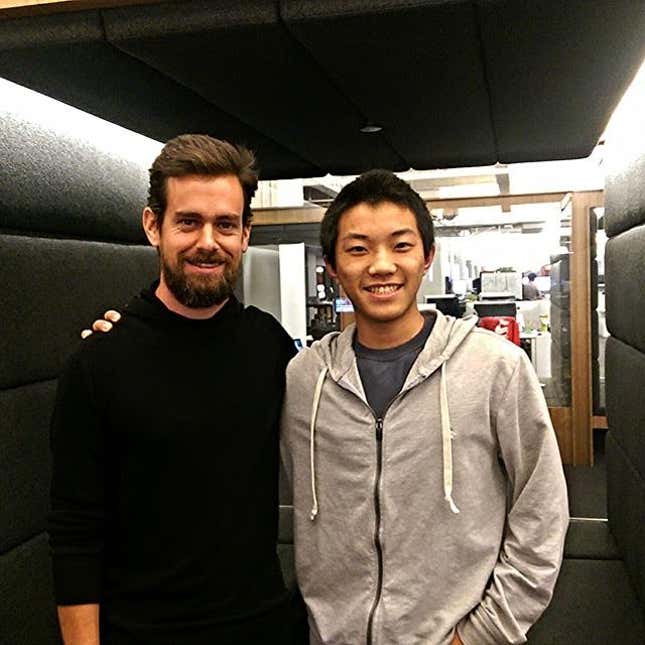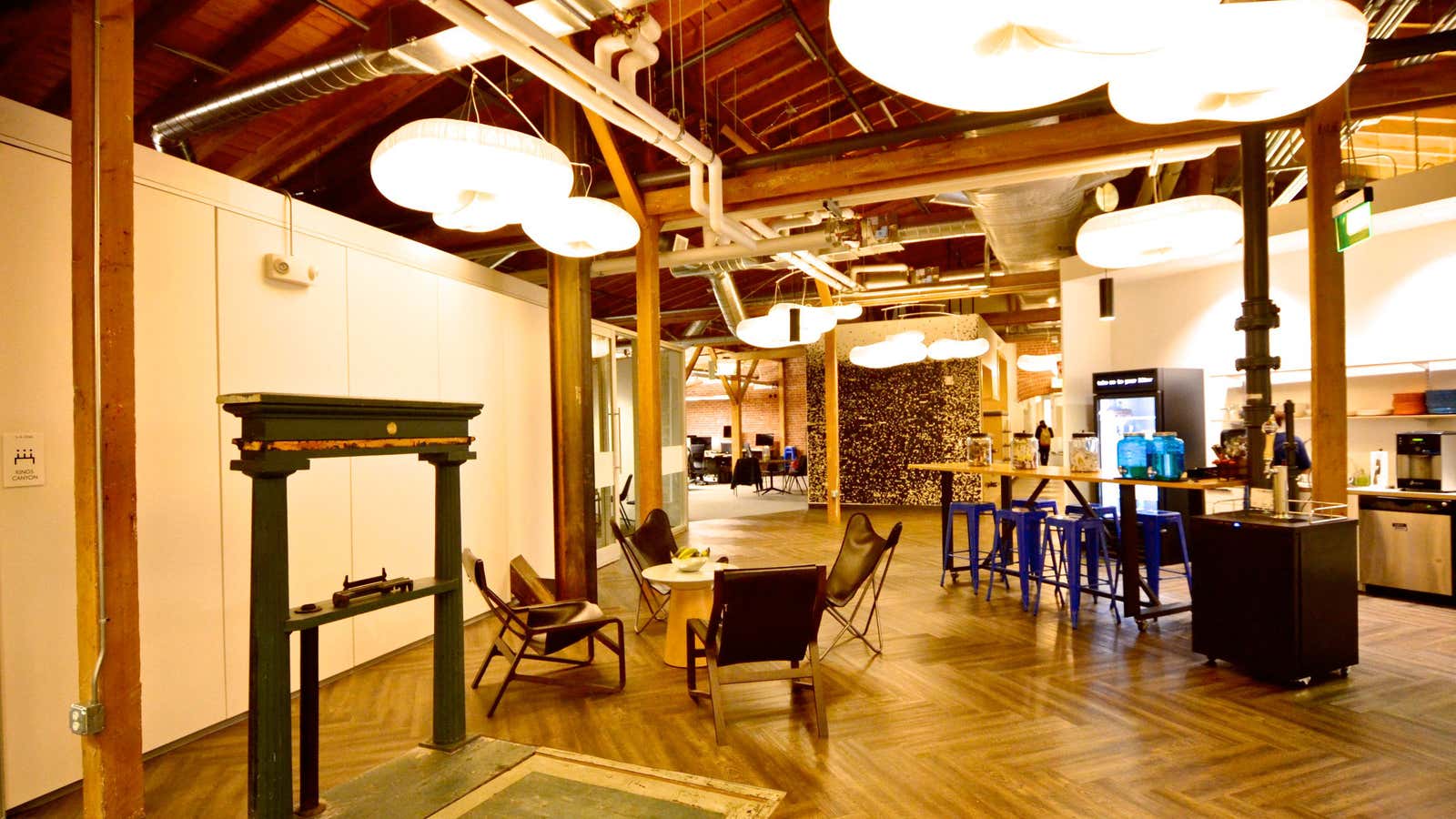If Tiger Shen would’ve stuck to the original plan, he’d be applying for colleges right now. Instead, the 17-year-old is four months into his first full-time job as a software engineer in San Francisco.

Shen joined Braintree at 16, shortly after graduating from high school in three years. At the PayPal subsidiary, he works on the core payments team, which he describes as “the gateway that processes all transactions that Braintree gets.” The companies that use Braintree’s underlying technology range from startups no one’s heard of to the most highly valued companies in tech.
“Every time someone takes an Uber, chances are the payment’s going to go through and touch something I worked on,” he tells Quartz. “It’s kind of scary.”
The native of Albany, California, a suburb next to Berkeley, landed his job—plus a few other offers—through the job marketplace Hired. A representative from Hired worked with him to highlight—not mask–the fact that he was so young, eager, and ambitious. “What I tried to do with my Hired profile was pretty much say, ‘I think I’m good enough. Just give me a chance to prove it to you, and I think you’ll be pleased with it.'”
And that’s what happened after Braintree reached out. Within two weeks, he completed a series of interviews—code challenge, phone screen, on-site technical interviews—and landed an offer.
Shen sat down with Quartz to talk about lessons he’s learned on the job, his surprisingly laid-back schedule, and his plans for college.
This interview has been condensed and edited for clarity.
How did you even finish high school so quickly?
School had always been kind of easy for me. There’s a 220-credit minimum to graduate high school, at least where I went. I was going to have 210 credits after junior year. I thought, “What am I going to do senior year? If I took two extra classes, can I graduate after junior year?” I went to my counselor, asked her, she said, “Oh yeah, that should be OK.” We kind of just planned it so I’d take two community college classes.
When did you learn how to program?
I think I started programming about two and a half years ago, and then I kind of got serious about it probably one and a half to two years ago.
My brother who’s a mobile developer suggested I pick up programming. I just went online, googled “how to program,” found a couple things, and started doing them. I didn’t really take it seriously at first. I found that as time went on and I had free time, one thing led to another.
My cousin was also doing a tech startup in San Francisco. I approached him. I thought I was getting better and better, and his company wanted some help with it, so I got an internship at Caviar. I kind of kept chugging along.
You also did an internship at Square your last year of high school. How did you balance that with a full course load?
My school workload was almost double what it had been because I was trying to graduate early, and I had standardized tests to deal with in the fall, college apps in the winter, and job interviews in the spring. It was insane.
I went to school from 8 to 3, tried to do as much homework as I could in class, and then hopped across the bay to Square, where I worked from maybe 3:30 to 9:30. After I got home, I had two hours or so to study before collapsing in bed and doing it all again the next day. Weekends were nonstop studying and catch up from the previous week.
After I graduated and accepted the job offer from Braintree, I pretty much spent six weeks in bed watching Netflix, and it was amazing. So, yeah, quite a year. Guess it all paid off in the end.
What’s your schedule like now that you’re working full time?
There is kind of a stereotype that engineers work very long hours. Coming in, I thought it’d be nice to be able to have a 40-hour week and have time to do what I want—60, 70, that’s not a problem either.
By nature of the pair programming I do, the team I’m on emphasizes that you should always be working with somebody. So everybody kind of gets in around 9, goes through the day. At 5, people start trickling out. At 5:30, it’s a ghost town. I don’t think I’ve worked more than 50 hours in a week. I was surprised, too.
How would you describe what you’ve learned on the job versus in a classroom setting?
There’s no comparison—probably 10, 100 times faster learning and picking stuff up when I’m in an environment where stuff’s happening quickly.
Our whole team does pair programming all the time, which means I’m always sitting next to someone and working with someone on the same problem. Most of the time, they know a lot more than me. Everyday I come in and there’s a flow of asking questions, getting feedback, and seeing their thought process. That’s been awesome. I feel like I’m learning a lot just by being around these people.
What are things you’ve learned from work that aren’t related to programming?
I guess everything about being here is pretty much the exact opposite of what I’m used to in a classroom, so there’s definitely a lot of adjustments I’ve had to make and am still making. Best practices, working on a large team—having everyone on the same page, interacting with teammates, interacting with managers, feeling out power dynamics and what not. I’m still trying to grasp a lot of that stuff.
Do you ever feel excluded for being so young? Is it a problem you can’t go to bars with your colleagues after work?
When other people are talking about their families and their kids or whatnot, I don’t have a ton to say.
I don’t think it’s a big issue [that I can’t go drinking with coworkers]. The bar is not the only place you can socialize. I haven’t run into any issues with that.
Were your parents OK with you not going to college right after high school?
In my family, for the first 15 years of my life I didn’t think there was anything I could do besides graduate high school and go to college unless I wanted to get disowned.
So I applied to colleges in the fall of my junior year. My intial plan was to take a gap year because I graduated a year early. I applied to Stanford early decision. A lot of my family went to [University of California] Berkeley so I also applied there. That all happened in the fall. I got rejected from Stanford, and Berkeley didn’t come out until later. Once Berkeley had come out, I had already gone down the path of thinking, “Oh, if I can get an internship, I can get a job.”
It doesn’t sound like your parents have disowned you.
From my point of view, it did take a lot of convincing, but I don’t think they were as adamant on me going to college right away like some other parents might be. My brother is 16 years older than me. He’s kind of a rebel. I like to tell people that they kind of got tired after raising him. I have a little brother, too. They kind of let us live a little more freely.
I’m getting kicked out [of the house] when I turn 18. Sometimes it’s hard to tell if my parents are joking or not, but that’s kind of what they’ve told me.
What are your plans for college?
So many people say college is the best time of your life. So definitely college is still on the table. I’m not applying this fall. I might do it next year. I don’t know what’s going to happen.
